SF8: Manxin: Episode 2 (Review)
by missvictrix
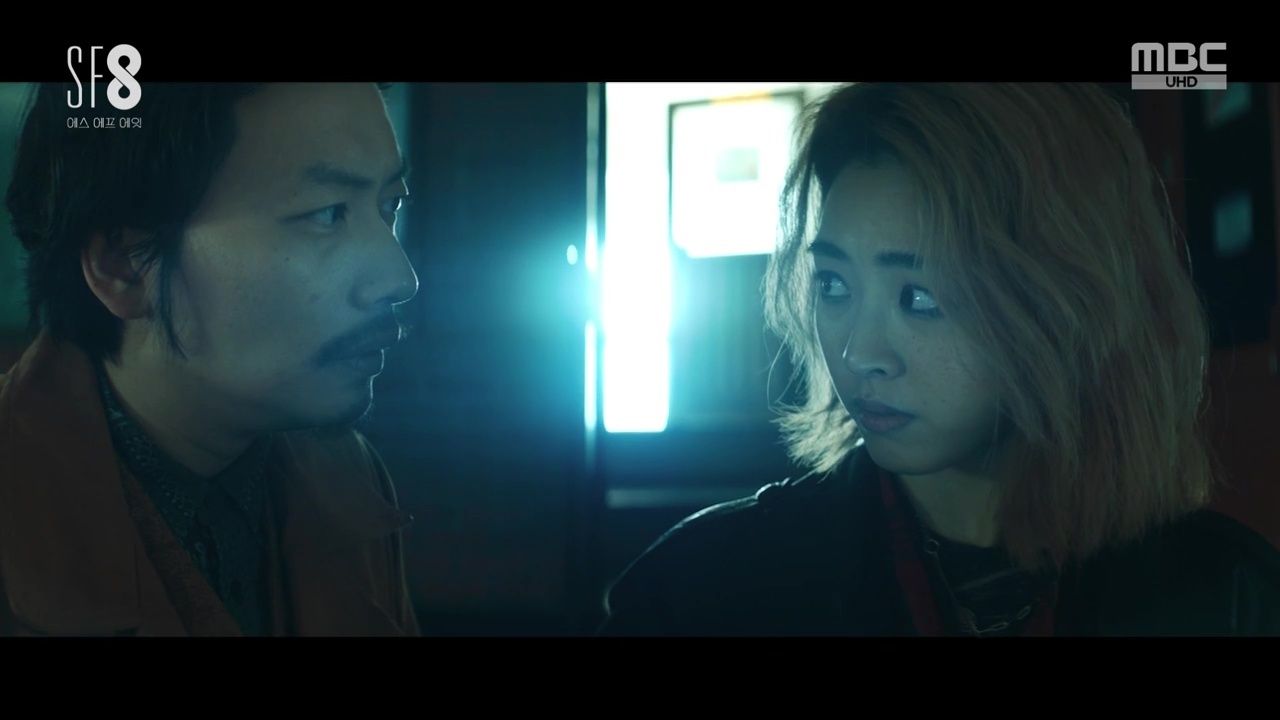
In Manxin, the second drama in the SF8 anthology, we explore a near-future world where an advanced AI has taken ahold of society. Though Manxin is quite short, it’s tightly told, and builds a great tension between the safety of knowing the future, and the freedom of choice and chance.
EPISODE 2 REVIEW: “Manxin”

In order for Manxin to work as well as it does, and in the confines of a 50-minute run time, it has to build its world quickly and adeptly. We have to understand what’s at stake, and identify with our players as the action rises. Manxin does this with a familiar construct, but one that works.
We follow our heroine TO SUN-HO (an almost unrecognizable Lee Yeon-hee) as she rides her motorcycle through Seoul. She’s listening to a radio program that quickly spells out the sort of world our heroine lives in: the substitute DJ explains how the head DJ stayed home because of the prophecy she received from Manxin, which told her to avoid leaving the house today. The DJ continues with, “Imagine not knowing what will happen to you today. People from this generation can’t understand what it’s like to live from day to day with the fear of not knowing.”

Embellishing this early set-up is some on-screen narration that explains that seven years ago, a fortune-telling app called Manxin was released. It uses a sophisticated big data algorithm to predict the future of its users, and it has a 96.3% accuracy rating. In those seven years it’s taken over the country, and peoples’ lives are ruled by their daily “fortune” or “prophecy,” and we learn that the nation is in a downward spiral because of it.
What we hear in the narration is quickly confirmed by what we see on the screen. The city is a wreck; there is homelessness, poverty, and the city generally just looks like it’s about to crumble. However, people live by the fortunes they receive on their cell phones, boasting how many times Manxin has saved them from harm and misfortune.
From the looks of her, our heroine doesn’t seem to subscribe to this sort of life. In fact, she practically shouts rebel, from her sarcastic, devil-may-care attitude, to her combat boots, leather jacket, and general badassery. While the DJ talks o prophecies that give steadiness to people’s lives, our heroine visits a giant sinkhole in the middle of a huge city intersection, and gazes into it with intention.
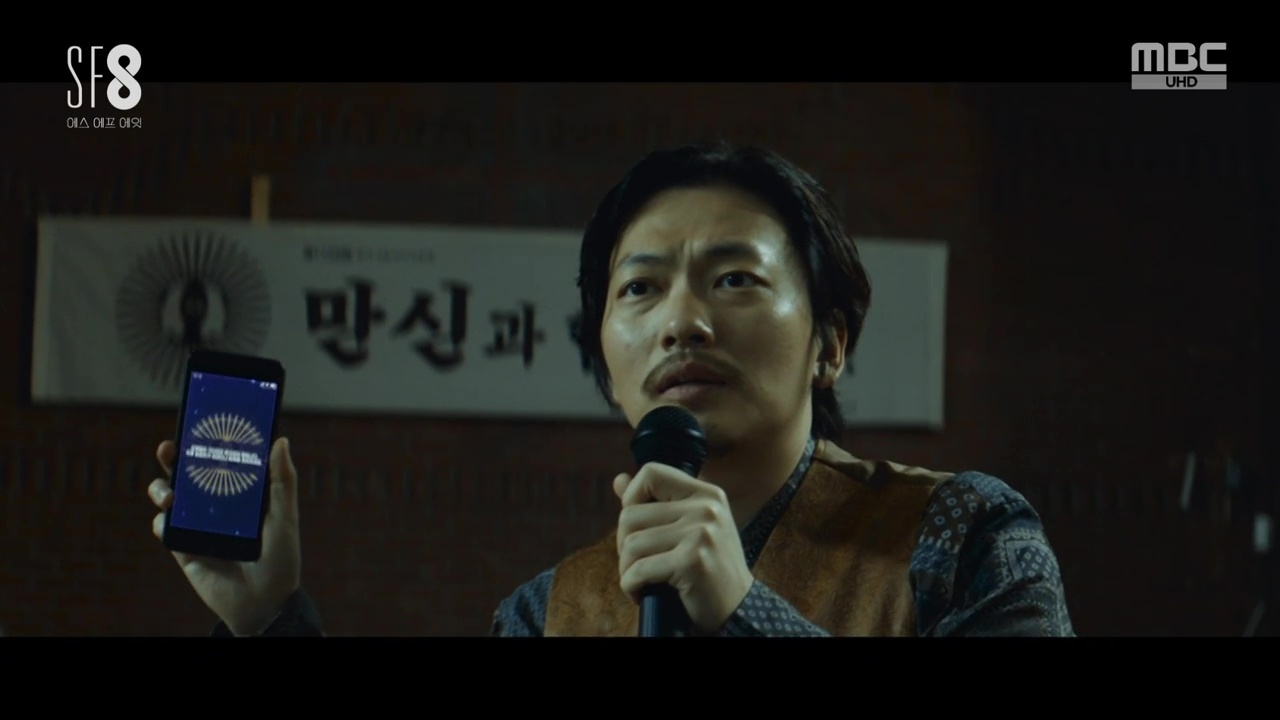
Sure enough, To Sun-ho is just as unique as her surname, which she explains is the rarest surname in the country. While the nation is crippled with an addiction to Manxin, she’s the only person that refuses to use it — in fact, she’s never even downloaded it, which just dumbfounds everyone around her, since Manxin is the new currency. People won’t do business or have interactions of any kind without checking and comparing each others’ fortunes to see/predict how it will go.
I can totally see why Lee Yeon-hee went for this role — it’s tough and cool with this awesome Sarah Connor vibe to it, and has the same feeling of a lone woman who knows the truth, and has to fight to save the future. Sun-ho is guided by raw emotion, and we meet her while her mission is already underway: to find Manxin.

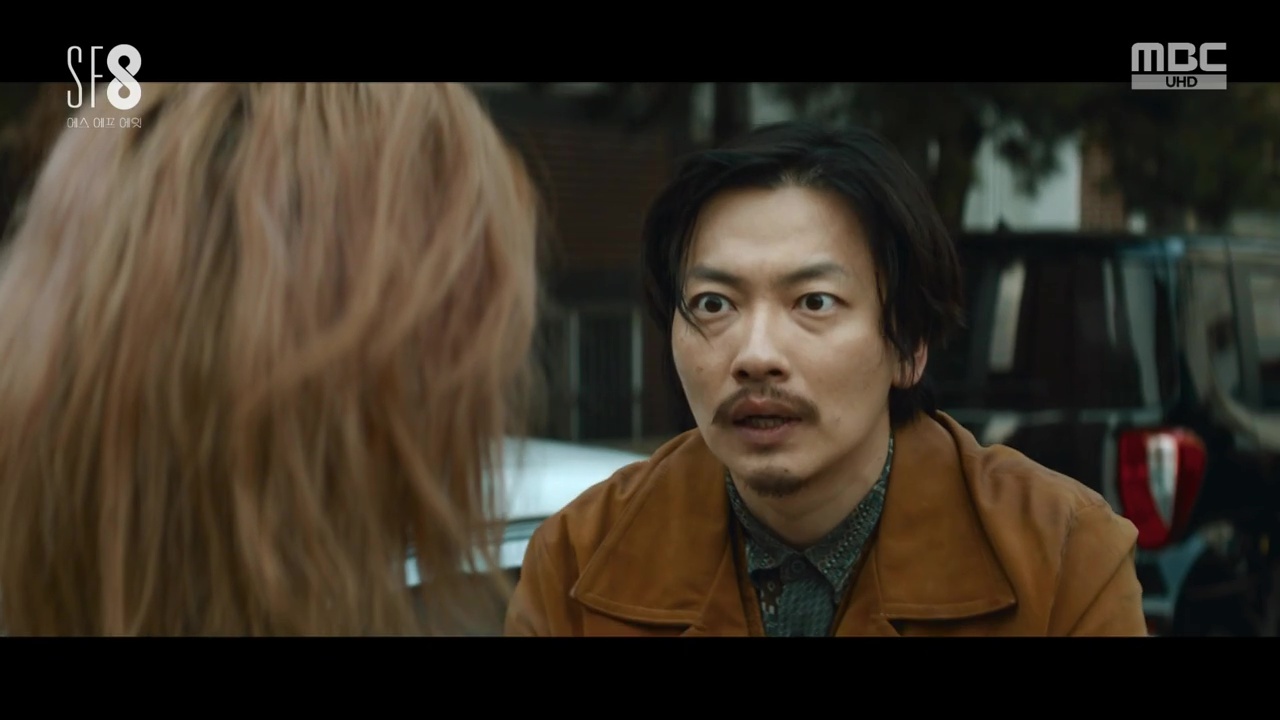
We don’t even know why Sun-ho’s on this crazy mission yet, but we know we’re with her. She’s looking for a man who was one of the early developers of Manxin, and her search sends her to a “church” where the members basically worship the app, which they call Lord Manxin. Their leader is JUNG GA-RAM (Lee Dong-hwi in a fantastic performance), a man who worships Lord Manxin because it saved his life, and lives by every word the app tells him.
For two characters of absolutely opposing world views, and goals, they make a pretty good team, and they’re soon on the search for Manxin’s developer (who’s a part of Ga-ram’s congregation). It’s here we learn Sun-ho’s true motive: her little sister was also a Manxin addict, and following the app’s guidance/prophecy, she died in the sinkhole that we saw at the opening of the drama. Sun-ho wants to find Manxin because she wants to know what it was that Manxin told her sister before she died.
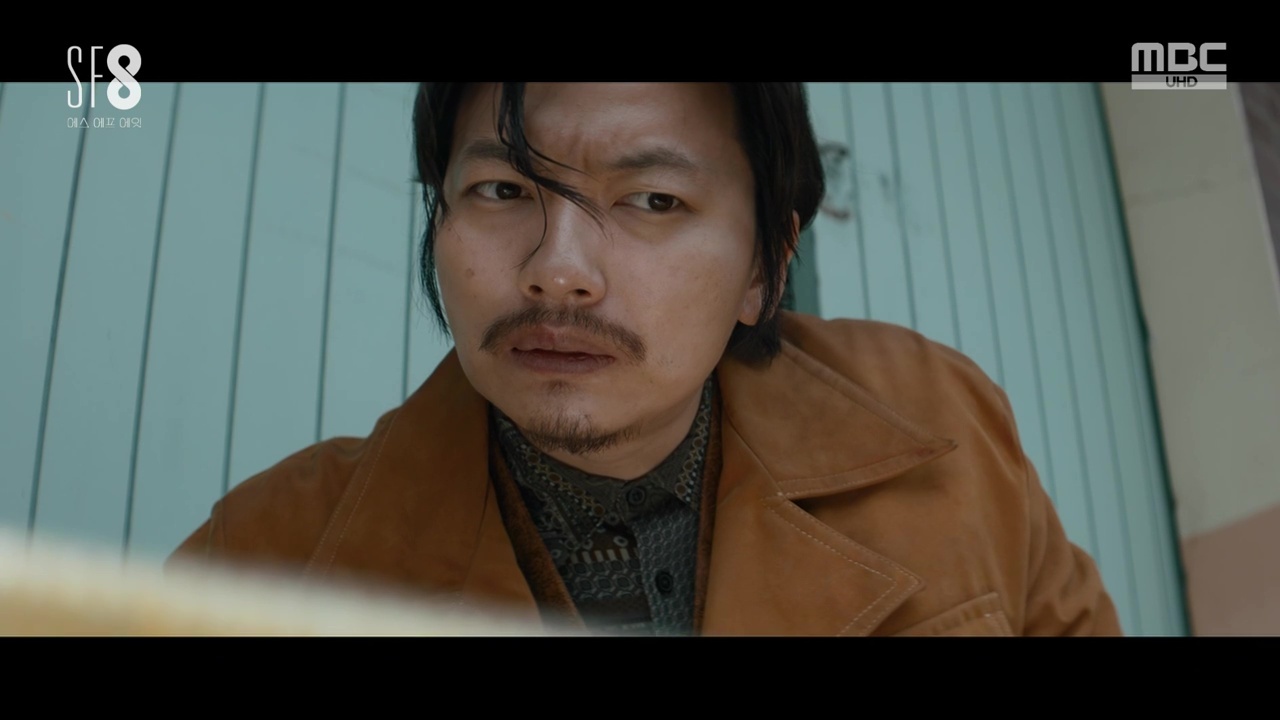
If Sun-ho’s motivation is finding the truth and exposing the real damage that Manxin is causing, Ga-ram’s is the opposite. His fortune that day was to “follow the north star” that will guide him — cue Sun-ho turning up at his church ready to break down the door with a giant embroidered star on the back of her leather jacket. It’s very much the “white rabbit” situation from The Matrix, but it works really well, and Lee Dong-hwi won me over after only a scene. He’s completely convincing as the manic app devotee, but at the same time, so human and relatable, with all the right touches of humor in his performance.
But there’s more at stake for Sun-ho and Ga-ram than just uncovering facts and attempting to find Manxin itself. The story also contains a heavy philosophy angle, as expected for a drama that pitches fate versus free will, and foreknowledge versus choice.
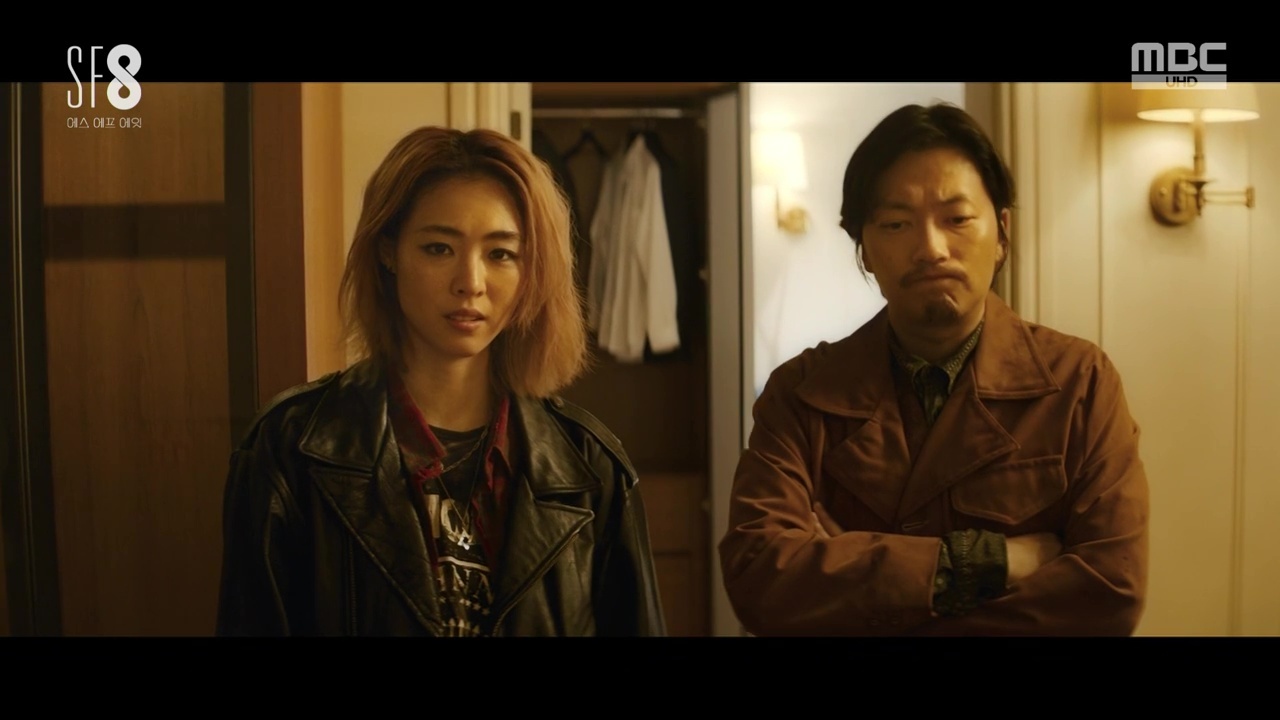
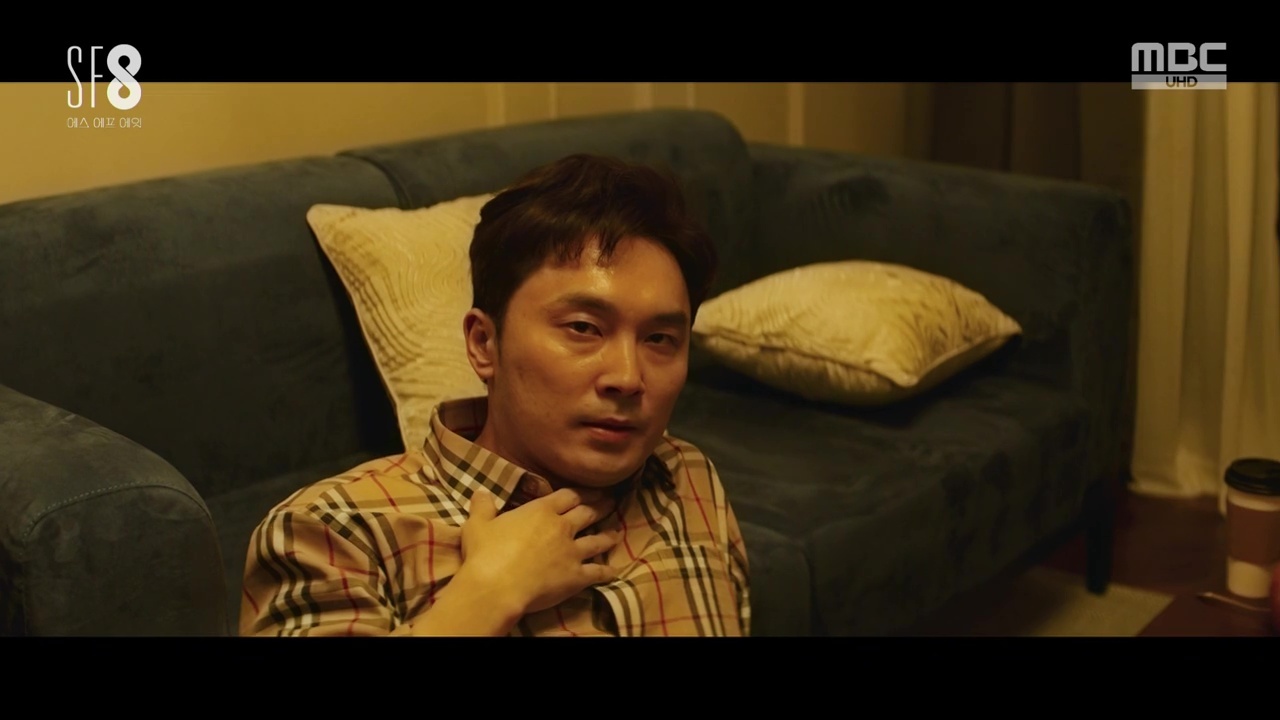
The two locate the app developer KIM IN-HONG (Seo Hyun-woo) hiding out in a hotel, but he refuses to see them because Manxin warned him of danger today. However, Sun-ho (who regularly doesn’t give a rat’s ass about any of the fortunes she hears), bangs down the door instead.
This hotel sequence in this drama is among the strongest, because while our leads learn important info for the plot, it also further exposes the question at the root of the drama: whether or not to live by Manxin’s predictions.
When In-hong meets with an accident in the hotel room, Ga-ram flips out, insisting that this could have been prevented if they had abided by Manxin’s warnings. Sun-ho, although she seems a bit shaken, counters that it was just chance, and In-hong was just unlucky. “We can’t know what might happen tomorrow,” she says. “Manxin knows!” Ga-ram screams back. Indeed, Manxin does seem to know, and it’s getting a little hard to tell what we should believe in.
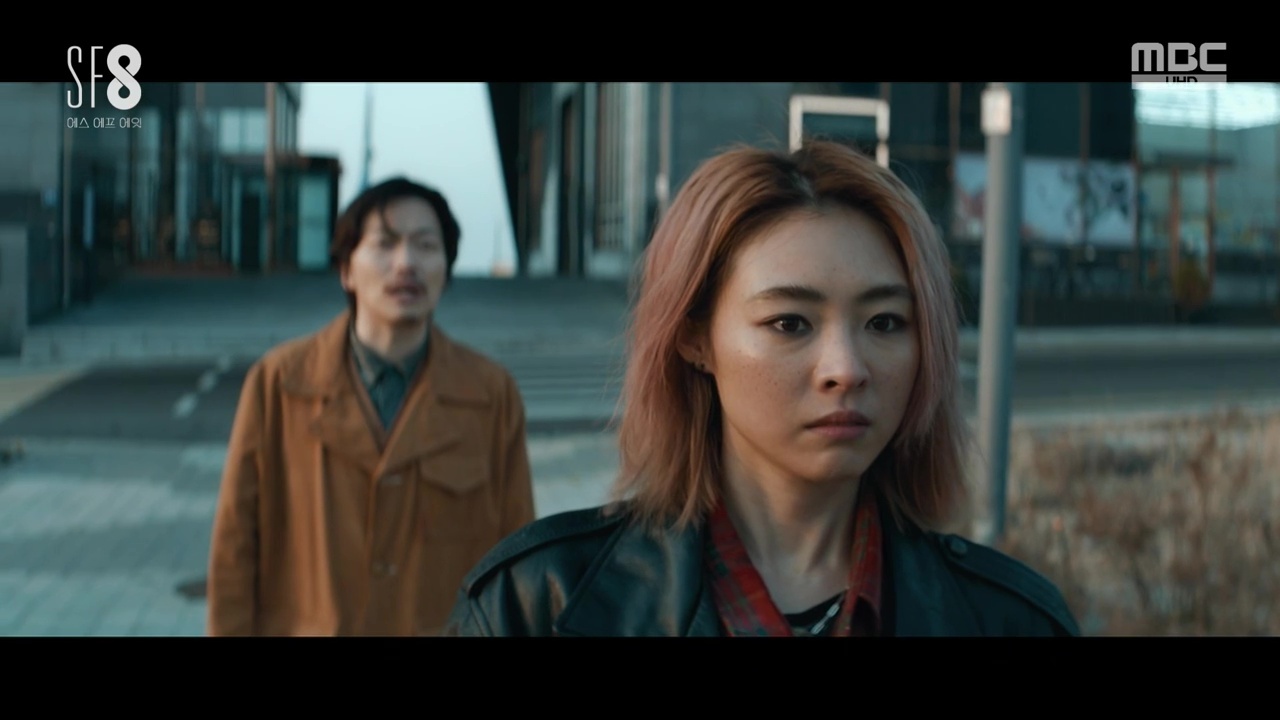
At this halfway point in the drama, our characters have a rift between them, and we’re really starting to wonder who is right. While Sun-ho surely has the right idea about Manxin becoming a dangerous addiction, and that relying on data to predict outcomes is ludicrous, we’ve also seen the predictions be eerily correct again and again.
Thus far the logic of the drama has been built on these two opposing viewpoints, but pretty soon things get complicated for our heroine. Sun-ho’s dog-headed mission is turned upside down when she learns a truth about her sister’s death: rather than having listened to Manxin’s guidance, her sister had actually deleted the app a week prior to her death.
So was the death just an accident after all? Bad luck? A consequence of chance? We see our heroine struggling through this new knowledge, but in a way it also frees her. She decides that Manxin or no Manxin, it doesn’t matter — what’s important is that we are still free to make choices. And so she does. She downloads the app.

Her fortune sends her on a final chase, and it’s a great sequence that intercuts Sun-ho as she downloads the app, and as she hops on her bike to continue her search. Except it’s not only for Manxin this time — it’s also for Ga-ram. His fortune, before they parted, warned him he would be lost if he was parted from his guide (Sun-ho at the time) and she leaves, looking for Ga-ram, looking for Manxin, and looking for answers.
The fantastic bit of editing during this last leg of the drama does just what it should: build tension, suspense, and lead us to the climax of the plot. There are some great reveals as we near the end, which I won’t spoil here, but I really enjoyed how the punchline of the drama was handled.
Is Manxin a gift, or is it an evil? Are our lives really able to be predicted by an algorithm, and does that guarantee our happiness? What will happen as the AI receives its final update?
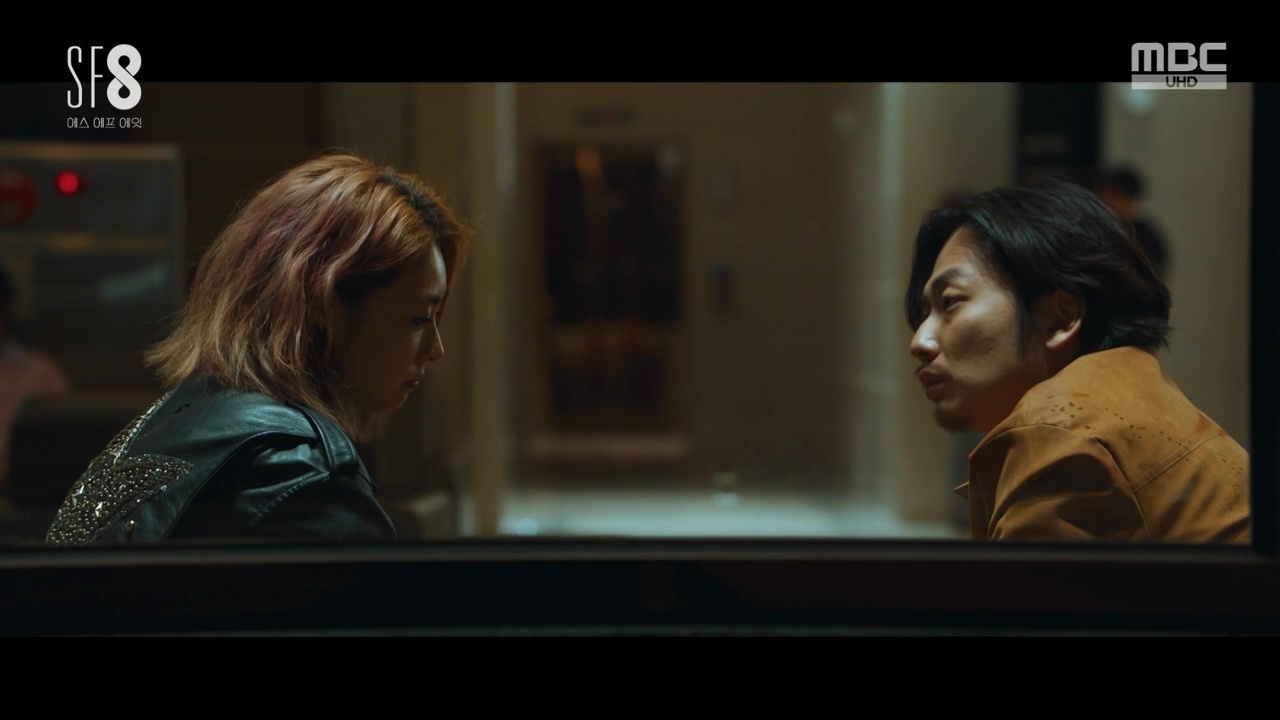
Although Manxin only had a short time to tell its story, I was impressed with how well it was constructed. Each scene of the drama acted like a different phase in the story, and the strong editing and believable characters brought it to life. In fact, I liked the world of this story and its conflicts so much that I found myself secretly wishing this was a full-length drama. I would have liked to see more of our characters, learn more about the developers behind the AI engine, and get more backstory on our characters. But perhaps wanting more of the story proves how good it was.
Manxin is the second drama in the SF8 anthology, and while the eight stand-alone stories all have sci-fi themes like AI, AR, and robots in common, thus far they’ve been very tonally different. In contrast to the first SF8 drama, which was disturbing and heavy, Manxin is very much your token dystopic AI-takeover story, with a lead character fighting for the freedom to be human. The construct might not be new, but it’s one of my favorites, and Manxin does it well.
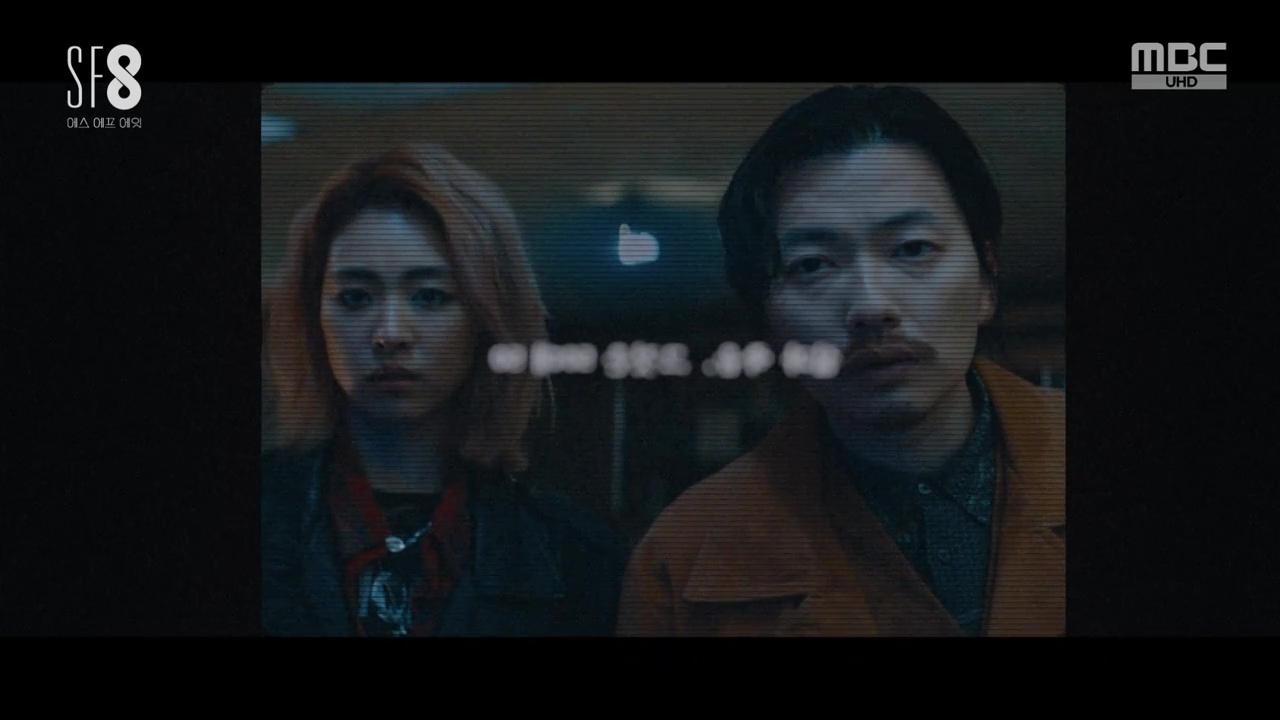
RELATED POSTS
Tags: Lee Dong-hwi, Lee Yeon-hee, SF8
![[Beanie Review] Light Shop](https://d263ao8qih4miy.cloudfront.net/wp-content/uploads/2024/12/LightShop_reviewb.jpg)








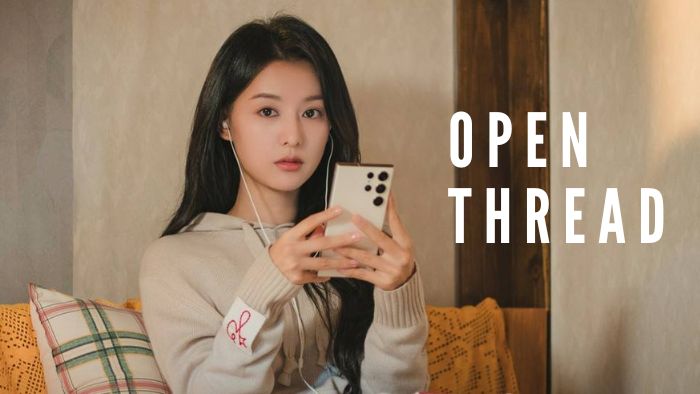
Required fields are marked *
Your email address will not be published. Required fields are marked *
1 Bob
August 30, 2020 at 9:17 AM
The only problem I have with 'Manixin' is the heroine's journey (which sounds like a bigger problem than it is). The sister's death is just the MacGuffin to send Sun-ho out to be the viewer's skeptical avatar exploring this world. Her actions have little to no impact on events. Manxin got its upgrade and made it's own 'life choice'. Sun-ho's presence to witness the event was superfluous, besides being a stand-in for the viewer. Everything that happened would have happened whether she was there or not.
Required fields are marked *
booitsjwu
September 2, 2020 at 3:31 PM
Comment was deleted
Required fields are marked *
booitsjwu
September 2, 2020 at 3:35 PM
In my opinion, that's one of the central points of the story; choice can be a potent and compelling illusion but it's an illusion all the same. Manxin wasn't creating a world without agency, it just helped reveal one that had always existed.
Required fields are marked *
LT is Irresistibly Indifferent and reminded of the slow march of death
September 19, 2020 at 9:04 PM
My biggest issue - and admittedly I'm still puzzling this one through - is that Manxin seemed to be luring them both these people in deliberately. It seemed to want them there at the end for some reason. And yet when the pieces all fall into piece it didn't need them for anything. I can't quite work out why Manxin went to such great trouble to nudge them both in this precise way if it didn't serve a purpose.
So I guess I agree with both of you. Yes, both our leads were there because they chose to be there. And that was the point. And yet I'm not sure why Manxin facilitated that.
Required fields are marked *
knewbie
September 19, 2020 at 9:51 PM
I didn't really see Manxin as manoeuvring Sun-ho and Ga-ram to go to it. Rather, from analysis of, say, Sun-ho's phone data or that of any device with which she'd had contact, Manxin could have concluded that she (and whoever was by her side) would end up at the programmer's home. If Sun-ho hadn't been looking for Manxin to begin with, or bumped into Ga-ram on the way, I doubt they would have got anywhere near that location.
Required fields are marked *
LT is Irresistibly Indifferent and reminded of the slow march of death
September 19, 2020 at 9:59 PM
Except that Ga-ram got two fortunes, both of which directed him to take steps that he wanted to take but would not (even could not) without the fortunes themselves. One of them - about losing his guide - turned out to be completely wrong (even a lie?).
knewbie
September 19, 2020 at 10:50 PM
I'm not sure, but when Manxin says "Don't lose your guide. You may be lost..." isn't it just warning that if the situation arises that you lose your guide, you may be lost? (Well, that's not so much a fortune as a statement of the obvious...) Ga-ram did lose his guide - Manxin as well as Sun-ho - and did as a result get lost for a while. Come to think of it, with Manxin becoming only 50% accurate, you could say he'd also lost his guide for good, and become as lost as any ordinary human being.
What was the other fortune?
2 sirena
August 30, 2020 at 10:22 AM
The first episode drew me into the story and I felt for the characters and the world that they inhabit. I remember telling my sister that they live in a world I would never wish to live in. Honestly, this episode was lacking although I can't pinpoint what bothered me exactly.
Required fields are marked *
LT is Irresistibly Indifferent and reminded of the slow march of death
September 19, 2020 at 9:06 PM
Maybe because it's much more straightforward? It's just a discussion of free will in an ordered universe. I kept waiting for something more. Although it's possible I haven't dug down deep enough yet.
Required fields are marked *
sirena
September 20, 2020 at 7:24 AM
@leetennant That could be. It wasn't a bad story I just didn't enjoy it as much.
Required fields are marked *
3 Edgar Pordwed
August 30, 2020 at 10:29 AM
Thanks a lot for reviewing these Missvictrix. The first episode had so many themes packed in an hour, this show really needs recaps or reviews. Yet to watch the second episode.
Required fields are marked *
4 knewbie
August 30, 2020 at 12:09 PM
Like ep1, ep2 has a theme that is practically a genre trope and a very striking setting that does most of the heavy lifting. The world of Manxin seems worryingly close to ours; as someone with a very basic smartphone and no religious beliefs, I could really relate to Sun-ho constantly being asked how she could live without Manxin or how she could justify not using it. Ultimately the resolution was a bit pat - I could have done without the super-obvious axioms about free will, uttered by random wise old men - but the journey there was a lot of fun, especially with the two sides of the debate being represented by two equally likeable characters.
Required fields are marked *
LT is Irresistibly Indifferent and reminded of the slow march of death
September 19, 2020 at 9:12 PM
To be reductive for a minute - and as someone who has little time for superstitious thinking - I struggled with how Manxin could have an accuracy rate of 96% when it delivered nothing but vague horoscope-esque predictions that could mean anything.
I was hoping and expecting a reveal to be that Manxin knew all but deliberately gave people vague predictions to retain their free will in how they chose to interpret them but it didn't go there unfortunately. I mean, the perfect example was the programmer who died. You could argue the only reason he died was because he pelted back to his room and kicked out his maid trying to avoid his vague Manxin fate. And how could Manxin have possibly known that from "big data"?
Frankly an AI mining big data to give predictions that are almost 100% accurate should deliver fortunes like "don't go to the dentist today" rather than "a misfortune will occur if you leave your home".
Required fields are marked *
5 Kay
August 30, 2020 at 8:21 PM
I love this episode so much !
Compared to Ep 1 which has the robot-human theme done to death, Ep 2 has the AI big data algorithms which are relatively new concepts.
I love how close to truth this is, right now we already have AI capable to make predictions through data mining and is getting better through machine learning.
Makes one thinks what happens if everyone follows predictions blindly and yet how easy and tempting it would be to have our future predicted accurately through an app.
Brilliant name, Manxin means many gods, and questions whether AI is the replacement for gods, as the 'church' here is already worshipping Manxin.
I think the ending climax was a bit underwhelming in execution, and yet poetic, that the AI 'learns' what is the best for humankind and chose its own path.
Required fields are marked *
knewbie
August 30, 2020 at 9:25 PM
I liked the way the ending was optimistic without being contrived or illogical. Personally I think the AI could have gone either way, or an entirely different way (e.g. that humankind should just be eradicated for the good of the planet), but it's also perfectly plausible that it should decide to take the less extreme, more familiar position.
Required fields are marked *
LT is Irresistibly Indifferent and reminded of the slow march of death
September 19, 2020 at 9:15 PM
And yet I'm stuck with this nagging feeling that you could interpret the ending as "sure, we can make decisions based on a greater knowledge of the world we live in but it's better to live in ignorance instead".
Required fields are marked *
LT is Irresistibly Indifferent and reminded of the slow march of death
September 19, 2020 at 9:28 PM
Now that I've thought about it a bit more, I actually think this episode's message is, "It's humans who want Gods but any being advanced enough to approach it would know that we're better off without them."
Required fields are marked *
knewbie
September 19, 2020 at 10:23 PM
I think you've got a point either way. IMO it's possible for Manxin, for all its fortune-cookie vagueness, to really be 96% accurate. In the case of the dead programmer, the data Manxin got hold of could include (1) a hotel where many accidents have occurred; (2) the programmer's medical history, e.g. prior falls, injuries; (3) one determined non-Manxin-user on his trail; etc. This kind of advanced reach and analytical power is not available to any ordinary human or even organisation - hence the religion parallel and the message that we're better off with faith rather than knowledge, and a 50%- rather than 96%-accurate Manxin.
Then again, foreknowledge attained via big data is different from that of a god. With Manxin, you still get to choose, and your choices can presumably change Manxin's predictions too. E.g. if the programmer had decided to cooperate with Sun-ho, albeit after a bit of a bust-up, perhaps Manxin would have predicted peace and quiet the following day. But the foreknowledge of an omniscient god isn't just foreknowledge - it is complete and perfect, and leaves you no room to manoeuvre. So I think you're also right about knowledge and ignorance. Manxin may be similar to religion but unlike god it doesn't have to be all or nothing. So why reject it completely or reduce its power when its judicious use would improve the lives of many by predicting natural and economic disasters, wars, pandemics, etc?
Required fields are marked *